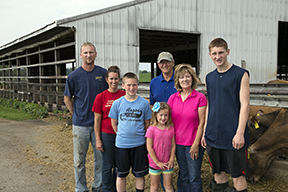 Most of us who come from multi-generation farming operations have either been part of a farm transition or have watched one take place. My memories of my family's transition include my father sifting through the paperwork and punching numbers into the calculator. Many farms face significant and sometimes scary challenges as this process takes place since, in many cases, the older generation remains a major source of knowledge and labor on the operation.
Most of us who come from multi-generation farming operations have either been part of a farm transition or have watched one take place. My memories of my family's transition include my father sifting through the paperwork and punching numbers into the calculator. Many farms face significant and sometimes scary challenges as this process takes place since, in many cases, the older generation remains a major source of knowledge and labor on the operation. At the 2015 Kansas Dairy Association annual meeting, Forrest Buhler, attorney with the Kansas Agricultural Mediation Services, suggested producers focus on planning in order to manage the business transition and allow for open communication and another generation of dairy producers.
The process of transition planning includes many human elements, and Buhler suggests the diversity of opinions created by the people involved is one of the biggest reasons business transition plans are so poorly executed on some operations. During his presentation, Buhler offered 12 tips for completing transition planning without hurting family relations. He said each member of the family should answer these 12 questions individually first, and then discuss them as a group.
1. Determine what matters most
2. Identify wants, needs, hopes and fears
3. Establish vision/mission statements, objectives and goals
4. Evaluate the human resources
5. Decide who will be in charge
6. Assess the farm's financial position
7. Develop inventory of resources
8. Analyze strengths, weaknesses, opportunities and threats of internal/external factors
9. Evaluate financial feasibility of future operation
10. Develop a business plan
11. Estate planning, retirement planning and business entity buffet
12. Put the plan into action
A full explanation of the steps can be found in the publication, Transition Planning: 12 Steps to Keep the Family Farming.
Every farm has its own story and, therefore, the transition plan will be different for each operation; however, that should not prevent discussions about transitioning from occurring.
Buhler ended his comments with a strict reminder regarding the importance of planning. "Transitions will happen, one way or another," he said. "If accomplished with effective communication and formal business planning, the result can be an operation that is highly competitive and will enable another generation to come aboard."

The author was the 26th Hoard's Dairyman editorial intern. She is a senior at Kansas State University in Manhattan, Kan. At KSU, Maggie is double majoring in agricultural communications and journalism and animal sciences and industry. Seiler grew up on a 130-cow registered Holstein dairy in Valley Center, Kan., near Wichita.







